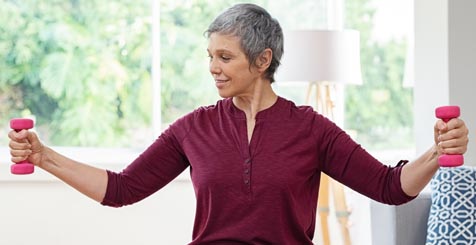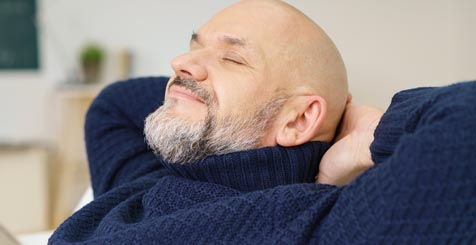Anxiety is the most common mental health condition and it’s nearly twice as common in women as men. While anxiety is a normal emotion, for some people it can start to take over and become overwhelming, causing feelings of panic and avoidance of stressful situations. Self-help and therapy can play a big part in managing anxiety, but what about exercise? Here are 10 ways exercise combats anxiety…
- Regular aerobic exercise gives long-lasting effects
The positive effect of a good session of aerobic exercise can last for several hours and a regular weekly fitness routine can help the symptoms of anxiety to lessen on an ongoing basis. Dancing, jogging or swimming, for instance, are all good aerobic activities that release endorphins – the body’s natural feel-good brain chemicals.
- Exercise restores quality of life
If you suffer from an anxiety condition your world may shrink as you avoid potentially stressful situations. You may have lost touch with friends and feel less inclined to go out. Exercise can provide a way of giving your life some new structure while reminding you of the importance of self-care. If you’re not ready to get out there yet, you can start an exercise routine at home and ease yourself into joining a class, club or gym when you feel mentally and physically stronger.
- Exercise can be an alternative to medication
Maybe you’ve already tried medication and would rather not be taking it. Or perhaps you don’t like the idea of starting to take tablets if there’s an alternative. Some studies suggest that exercise can work as well as medication for some people, and it’s worth discussing this with your doctor, who can advise you depending on the severity of your anxiety.
- Exercise works best with consistent activity
Being consistent can make a lot of difference in how well exercise works for you as a way of managing your anxiety. You’ll notice the biggest difference once you’ve been following your new routine for a couple of months. Whether you’re working out at home, jogging outside or doing an organised activity, having set days and times when you exercise will provide a healthy routine. Aim for a session of at least 30 minutes, with three to five sessions a week, to get the most out of it.
- Exercise can be mindful
When you exercise, you can focus on how your body is feeling. How is your breathing changing, how is your body is moving? Examine your thoughts: are you encouraging yourself or shouting instructions to keep going? How about your surroundings – what are the sights and sounds? All of this acts as mindful meditation and takes you out of your normal thought patterns.
- Exercise boosts your energy
There’s a strong link between anxiety and feeling fatigued. Being anxious all the time is hard work for your body because it’s constantly on high alert. When the adrenaline wears off, your energy levels slump. Exercising regularly will give you an immediate hit of natural energy that can help you feel less tired and more motivated so you can get more done.
- Exercising helps you sleep better
Maybe your anxiety levels are stopping you from sleeping properly at night. Insomnia is a common side effect of anxiety. Napping during the day can help you get around it, but may then add to the problem of struggling to get to sleep when you go to bed. Exercising helps your muscles to relax and your body to switch off when it needs to.
- Exercising gives you confidence
As you become fitter you’ll feel more confident in yourself and you’ll gain a sense of pride in your achievement as you reach new milestones. You’ll literally stand taller as your muscles relax and your posture improves.
- Exercising helps build social connections
It’s very easy to become isolated if you suffer badly from anxiety. You can use exercise as a gentle way to increase social contact on your own terms. Whether you’re taking a walk around the block or doing aqua aerobics, there’s always the opportunity to smile and say hello.
- Exercise is a healthy coping strategy
When you feel anxious it can be tempting to resort to unhealthy habits as a way of coping. That might be anything from smoking, drinking or dwelling on unhelpful thoughts to compulsive online shopping or gambling. Exercise will not only bring physical benefits, but it’s a healthy coping mechanism. Think of it that way, rather than being a chore, and you can give yourself credit for making good choices every time you get active.
It’s important to remember that everyone is different. Some people find that exercising helps them a huge amount, while others don’t get the same degree of positive impact on their anxiety. While exercising isn’t a magical cure for anxiety, it can certainly help you to regain control, manage your symptoms and feel better physically. If you’d like to find out more about anxiety, visit Anxiety UK.
Medical information. This is provided for informational purposes only and is not meant to be a substitute for advice by a doctor or other qualified healthcare professional. Patients should not use the information on the Active Patients website for diagnosing a health or fitness problem or disease. Patients should always consult with a doctor or other health professional for medical advice or information about diagnosis and treatment. Never ignore professional medical advice because of something you have read on Active Patients.






